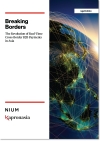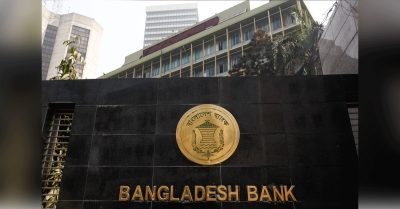Latest Insight
- Why an expected APAC fintech consolidation wave has yet to come
- Why cash is still prevalent in Asia
- Japan steps up green finance efforts
- South Korea charts middle path on crypto
- Should Grab and GoTo merge?
- Singapore pushes ahead with fintech-driven sustainability
- Digital banks in South Korea continue to thrive
- Billease is the rare profitable BNPL firm
- Fintech sector in Pakistan faces mounting challenges
- Where digital banks in Asia can make a difference
Latest Reports
-
Breaking Borders
 Despite progress in payment systems, the absence of a unified, cross-border Real-Time Payments (RTP) network means that intermediaries play a crucial role in facilitating connectivity. This report examines the ongoing complexities, challenges, and initiatives in creating a seamless payment landscape across Asia. Innovate to Elevate
Despite progress in payment systems, the absence of a unified, cross-border Real-Time Payments (RTP) network means that intermediaries play a crucial role in facilitating connectivity. This report examines the ongoing complexities, challenges, and initiatives in creating a seamless payment landscape across Asia. Innovate to Elevate In the dynamic and diverse financial landscape of the Asia-Pacific (APAC) region, banks are at a pivotal juncture, facing the twin imperatives of innovation and resilience to meet evolving consumer expectations and navigate digital disruption. Catalyzing Wealth Management In The Modern Era
In the dynamic and diverse financial landscape of the Asia-Pacific (APAC) region, banks are at a pivotal juncture, facing the twin imperatives of innovation and resilience to meet evolving consumer expectations and navigate digital disruption. Catalyzing Wealth Management In The Modern Era Hyper-personalized wealth management presents a paradigm shift from traditional models relying on static, generalized segments. Developing tailored investor personas based on psychographics, behaviours and fluid financial goals enables financial institutions to deliver rich and tailored customer experiences that resonate with next-generation priorities.
Hyper-personalized wealth management presents a paradigm shift from traditional models relying on static, generalized segments. Developing tailored investor personas based on psychographics, behaviours and fluid financial goals enables financial institutions to deliver rich and tailored customer experiences that resonate with next-generation priorities.
Events
| October 21, 2024 - October 24, 2024 Sibos Beijing |
| November 06, 2024 - November 08, 2024 Singapore Fintech Festival |
We have learned by now not to get our hopes up for digital banks to dramatically alter the market landscape in most countries – but there are still exceptions to the rule. With one of the world’s largest unbanked populations – 60 million adults – and an overall population of 169 million not especially well served by incumbent banks, Bangladesh appears to be an exception. For that reason, the Bangladeshi central bank’s recent decision to allow eight digital lenders will not be overkill.
There is something about digital banks in South Korea. Just like most incumbent banks – and unlike many of their digital peers – they tend to be profitable. Toss Bank, the digital banking unit of fintech unicorn Viva Republica, is no exception to the rule. In the July to September period, it recorded its first profitable quarter, which means that all three of the country’s digital lenders, which also include Kakao Bank and K Bank, are now moneymakers.
More than four years after the financial centers of Hong Kong and Singapore announced they would allow digital banks, the online lenders have failed to disrupt those respective markets. They have opened plenty of customer accounts, but their deposit bases remain modest, as does their addressable market.
Elsewhere in the region, digital banks have larger potential markets, especially in Indonesia and the Philippines. Still, stiff competition and a lack of product differentiation mean that it is often necessary to subsidize customers to secure temporary loyalty. Some of these digibanks are also constrained by the focus of their parent companies on other businesses unrelated to financial services, like ride-hailing and food delivery.
The only countries in Asia where digital banks have found the secret sauce are China and South Korea, which can be attributed to both the innovative business models of online lenders and the unique market characteristics of these two countries.
China as a digital banking pioneer
In 2023, China’s fintech market is both mature and constrained by a lingering crackdown on Big Tech. But rewind to roughly a decade earlier and it was a hotbed of digital financial innovation. China’s preeminent platform companies Alibaba and Tencent, having found success in e-commerce and gaming, respectively, pushed aggressively into digital financial services with implicit support from regulators that supported the financial inclusion benefits and the efficiency gains from the widespread digitization of payments. They capitalized on weak digital offerings from incumbents, incumbents who often chose to work with the tech giants in consumer lending – when regulators still permitted it, of course.
In 2019, the last year before the pandemic and China’s tech crackdown (both of which have weighed on earnings), Tencent-backed WeBank posted a net profit of $565 million and Alibaba-backed MYbank recorded net income of $180 million. Both online lenders first became profitable in 2016, about a year after being founded.
Amid China’s tech crackdown and the country’s economic travails, MYbank has pivoted to supporting social welfare and rural entrepreneurship – and has also joined the digital yuan pilot program. WeBank has also joined the digital RMB initiative.
While it remains to be seen if either of China’s digital banks can ascend to their previous zenith, their leveraging of the respective Alibaba and Tencent ecosystems, surging smartphone adoption and strong customer demand for digital financial products has proven to be a winning formula.
First mover’s advantage
Besides China, South Korea is the only other Asian country where digital banks have reached profitability and seem able to stay there. Kakao Bank is by far the country’s most profitable online lender, benefiting from its super-app approach with the ubiquitous Kakao Talk messaging app at its core. Like WeChat in China, Kakao Talk is a way of life in Korea. When Kakao Bank launched in 2017, it had a ready potential market of millions of Kakao Talk users – who are now estimated at around 47.6 million in South Korea – a majority of the population of 52 million.
Kakao Bank can be thought of as the first mover among Korea digibanks, and it only needed two years to reach profitability. It exploited the lack of competition to grow briskly while simultaneously eschewing the incautious – and expensive – international expansion we have seen from Western digibanks like Revolut.
In the first three quarters of 2023, Kakao achieved a record-high net profit of 279.3 billion won ($214.12 million) thanks to increased lending to borrowers attracted by its low-interest rates.
In the first nine months of the year, Kakao’s deposit balance also increased from 34.6 trillion won to 45.7 trillion won, a growth of 11.1 trillion won, or 32.1%.
Crypto fever
K Bank is another profitable digital bank in South Korea, though its business model seems to be less sustainable than Kakao’s given its reliance on cryptocurrency. In fact, K Bank had to suspend operations a few years ago due to capitalization problems and when it re-emerged it inked a deal with leading Korean crypto exchange Upbit in which the exchange’s customers use K Bank for deposits. Since then, K Bank’s deposits have surged.
K Bank recorded a profit of 13.2 billion won in the third quarter, down significantly from 25.6 billion won during the same period in 2022. K Bank attributed the fall in profit to one-off provisions.
There could be trouble ahead for K Bank though. Korean media recently reported that a remarkable 70% of its deposits are tied to cryptocurrency. Since K Bank has about 15 trillion won (US$11.5 billion) in deposits, more than US$8 billion of the total is linked to crypto. What makes this worrisome is that the rules are murky when it comes to protecting customer deposits in the event of say, a run, on the crypto exchange Upbit – or a serious hack.
More exceptions to the rule?
Looking ahead, we do not expect many other digital banks in Asia will be able to replicate the success of WeBank and MYbank in China or Kakao and K Bank in Korea. Incumbent banks have entrenched strategic market positions in both Hong Kong and Singapore, and while there may be niche market opportunities in segments like wealth management for non-ultra high net worth individuals, overall, low-hanging fruit is scarce.
In Southeast Asia, both Indonesia and the Philippines present ample market opportunities, but competition is fierce, while in well-banked Malaysia and Thailand it is unclear how much of an opportunity there really is. What we have observed in Southeast Asia thus far is that large conglomerates are teaming up with platform companies like Sea GroupSE +1.5%, Grab and GoTo as well as Alibaba and Kakao, pooling their significant capital and resources to pursue strategic long-term plays. These juggernauts can afford to be patient and burn a little cash since they are in it for the long run.
Noticeably absent from any of this activity, with very few exceptions, are pure-play digibanking startups, and we expect it will remain that way. In Asia, it seems that digital banking is primarily a means for established tech companies – or telecoms in the case of K Bank, which is backed by KT Corporation – to expand into financial services and thus find new avenues for growth.
By several metrics, GCash is the most successful Philippine fintech. As of May, it claimed to have 81 million users (in a country of about 114 million) while the company said last year that it achieved profitability three years ahead of schedule. That said, GCash is not resting on its laurels and is stepping up both international expansion and a push into the B2B market.
The market opportunity for digital banks in Hong Kong has always been open to interpretation, and their balance sheets (with a few exceptions) 4.5 years after the Hong Kong Monetary Authority (HKMA) announced it would allow online lenders reflects that reality. The Greater Bay Area could offer some additional opportunities, but like most of China, it has achieved a reasonably strong level of financial inclusion. For these reasons, as we observe Hong Kong-based WeLab launch a digital bank in Indonesia, we think that it has a more promising business strategy than some of its competitors. To be sure, Indonesia has increasing digital banking competition, but a large segment of the population remains unbanked and underbanked.
In August, the China Securities Regulatory Commission unveiled some potential modest market reforms to strengthen investor confidence and trading in Chinese capital markets. These measures included extension to trading hours for the country’s stock and bond markets, lower transaction fees for brokers and the encouragement of share buybacks. While these measures are welcome and could help boost China’s capital markets, there are underlying economic and political issues that need to be addressed if China’s stock market is to recover definitively.
It was not long ago that we were wondering if the Melborne-founded and Singapore-headquartered fintech unicorn Airwallex had scaled back its ambitions, which historically have been lofty. It is safe to say that is not the case. Indeed, Airwallex continues to push into new markets aggressively, including in the past six months both Israel and Mexico.
Across Southeast Asia, the business models of platform companies are being put to the test – and the results are still inconclusive. We can appreciate that a focus on quarterly earnings may obscure positive long-term trends – and Sea did not have the best quarter – but it is undeniable that the much-heralded ecosystem business model that emerged in the past few years could have some fundamental problems. In the case of Sea Group, it has a promising digital financial services business that grew out of its earlier ventures in e-commerce and gaming, but the latter two businesses are struggling. We still like their odds better than ride hailing and food delivery, but Sea has figure out a way to turn them around and revamp the synergies that drove the company’s share price to an apex of almost US$367 in October 2021. It has since lost about 90% of its value and trades around US$37.
Not all Southeast Asian platform companies are created equal, nor do they perform equally. Unlike some of its counterparts, Bukalapak has never swung for the fences. Rather, it has focused on its substantial home market of Indonesia and building a digital services ecosystem for Southeast Asia’s largest economy that increasingly features more financial products. The strategy appears to be bearing fruit, and Bukalapak has recorded seven straight quarters of adjusted EBITDA profitability.
The plot continues to thicken in one of the largest money laundering cases in Singapore’s history. Complicating matters is the sensitivity of certain aspects of the case, given the large number of ethnic suspects with ties to China and the multiple banks both local and international ensnared in the ongoing investigations.
More...
Grab, founded in 2012, hit a milestone in the third quarter: It recorded its first profit on an adjusted EBITDA basis. The Singapore-based platform company is better known for burning almost unfathomable amounts of cash in a race to build scale, so adjusted EBITDA of US$29 million is a significant achievement. The company’s revenue rose 61% on an annual basis to US$615 million while its losses fell to US$99 million. The question now is if Grab has turned a corner decisively and is headed for long-term profitability in the vein of Alibaba, Tencent and Amazon, or if it is more likely to struggle to stay out of the red like Uber and Lyft.
Observing that GoTo managed to reduce its losses in the third quarter, we are wondering to what extent this platform company created from a merger of Indonesia’s two most prominent tech startups is on the right track. Its stock hit a 52-week nadir of 54 rupiah on October 16, but since then, boosted by investor enthusiasm about its quarterly earnings, has risen to more than 40% to 76 rupiah.
Some incumbent banks may be slow to digitize, but apparently not the big commercial lenders in Thailand. We have been tracking the transformative digitization of Siam Commercial Bank (SCB) for several years now and are intrigued to see that another large Thai lender is adopting an aggressive digital-first strategy. Given its humble roots as Thai Farmers Bank (established in 1945 with registered capital of 5 million baht), Kasikornbank, commonly known as KBank, has come a long way. As Thailand’s second largest commercial bank today, it should be observed with great interest as it accelerates digitization efforts and invests in new segments of financial services.
Singapore-based fintech startup YouTrip is a now officially an anomaly: It managed to raise US$50 million in what is a relatively challenging period for fintech funding given high interest rates, an uncertain global economy and persistent geopolitical tensions in different parts of the world. In an interview with Nikkei Asia, CEO Caecilia Chu said YouTrip, together with a local financial partner, would launch its multicurrency wallet in Malaysia in a few months’ time while simultaneously beefing up its presence in Singapore and Thailand.
The fragmentation of e-wallets in Asia poses a challenge for any company trying to build a payments rail that can work smoothly throughout the region. With the exception of China, where a duopoly of Alipay and Tenpay still prevails, most Asian countries have dozens, if not tens of dozens, of digital payment methods. This holds true for the richest countries in the region like Japan and Singapore, as well as developing nations in South and Southeast Asia. For this reason, we are carefully observing the progress of Ant Group’s Alipay+ initiative in the region to see if it can achieve a breakthrough.















